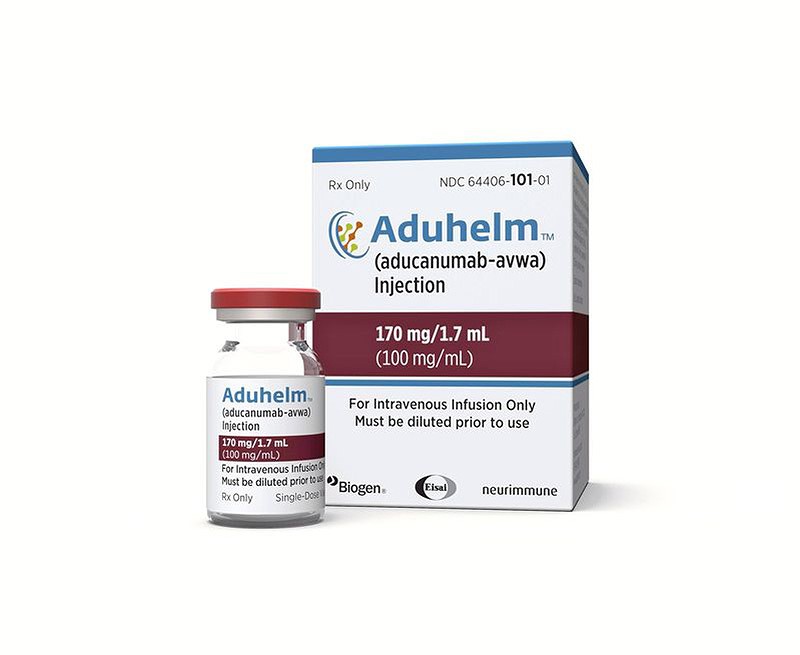
The FDA-approved Alzheimer’s drug aducanumab
13:22 JST, December 18, 2021
Aducanumab, the first drug aimed at suppressing the long-term progression of Alzheimer’s disease, has reached the final stages of the domestic approval process. Despite the worldwide attention and promise surrounding aducanumab, it’s approval is not a done deal.
The drug’s approval in the United States in June came with the caveat that additional clinical trials must be conducted due to insufficient proof of efficacy.
The European Union announced a negative point of view about the drug on Friday, recommending refusal of authorization to market it.
Now with no global consensus, the Health, Labor and Welfare Ministry is under pressure to make a difficult decision.
Constant inquiries
“When will it be approved in Japan?”
Ever since the U.S. Food and Drug Administration (FDA) approved aducanumab, which was developed jointly by the U.S. pharmaceutical company Biogen Inc. and Japan’s Eisai Co., Memory Clinic Ochanomizu in Tokyo has received an endless stream of inquiries like the above.
Takashi Asada, the clinic’s director, who has cooperated with clinical trials in 20 countries including Japan, said: “My impression is that its effect on delaying progression is gradual. Even so, patients have high hopes.”
Aducanumab acts by removing amyloid beta, a protein believed to cause Alzheimer’s disease, from the brain. It is hoped that intervening early to remove amyloid beta with a monthly intravenous drip will slow the progression of the disease.
This is a different mechanism than previous dementia drugs, which only produce a temporary improvement in symptoms. However, it does not restore cognitive decline that has already occurred. Only patients with early-stage Alzheimer’s or mild cognitive impairment, an even earlier stage, are eligible for aducanumab.
The approval application in Japan was filed in December last year. The approval process generally takes one year. The one-year mark was reached on Dec.10, with no conclusion yet.
Little uptake in U.S.
Six months have passed since approval was granted in the United States, but so far the drug is only being administered in about 120 institutions there. This is largely because of issues in the data demonstrating effectiveness from the clinical trial process.
In one of the two final trials, administering the drug for 18 months suppressed cognitive decline by 20%, but the other trial did not see any effect. Some believe this is because the dose was too low.
The FDA granted its approval under a system designed to quickly make drugs for serious illnesses that have no other effective treatments available for use.
The approval stated that based on data showing a reduction in amyloid beta in the brain, a clinical effect is “reasonably likely.”
However, Biogen must conduct additional clinical trials and submit a final report in 2030. The approval may be revoked depending on these results.
Going ahead with guidelines
“We understand [the review of aducanumab is] in the final stages, but Japan has to be cautious,” a senior health ministry official said.
While doubts have been raised about the drug’s effectiveness, an association which represents people with dementia and their families in Japan asked the health minister in September to quickly grant approval.
“It will be a difficult decision, but Japan may approve it not only based on the clinical trial data but also because of the lack of effective treatments for dementia,” said University of Tokyo Associate Prof. Shunsuke Ono, an expert on government regulation of pharmaceuticals.
However, even if approval is granted, questions about insurance coverage will remain.
While Eisai estimates there are 1 million potential patients for the drug nationwide, the cost is high: $56,000 (about ¥6.35 million) per patient per year in the United States.
Japan’s drug prices are often half of U.S. prices or even lower, but some are still concerned about the drug’s financial burden on the health care system.
“When the new drug is approved, it is expected that the eligible patients will be limited to some extent by guidelines created by the government and academic societies,” said Ataru Igarashi, associate professor of medical economics at Yokohama City University.
Looking ahead to approval, related academic societies and others have been discussing guidelines for who should get the drug and at what institutions.
Top Articles in Society
-

Man Infected with Measles Reportedly Dined at Restaurant in Tokyo Station
-

Man Infected with Measles May Have Come in Contact with Many People in Tokyo, Went to Store, Restaurant Around When Symptoms Emerged
-

Woman with Measles Visited Hospital in Tokyo Multiple Times Before Being Diagnosed with Disease
-

Australian Woman Dies After Mishap on Ski Lift in Nagano Prefecture
-

Foreign Snowboarder in Serious Condition After Hanging in Midair from Chairlift in Nagano Prefecture
JN ACCESS RANKING
-

Japan PM Takaichi’s Cabinet Resigns en Masse
-

Japan Institute to Use Domestic Commercial Optical Lattice Clock to Set Japan Standard Time
-

Israeli Ambassador to Japan Speaks about Japan’s Role in the Reconstruction of Gaza
-

Man Infected with Measles Reportedly Dined at Restaurant in Tokyo Station
-

Videos Plagiarized, Reposted with False Subtitles Claiming ‘Ryukyu Belongs to China’; Anti-China False Information Also Posted in Japan





















